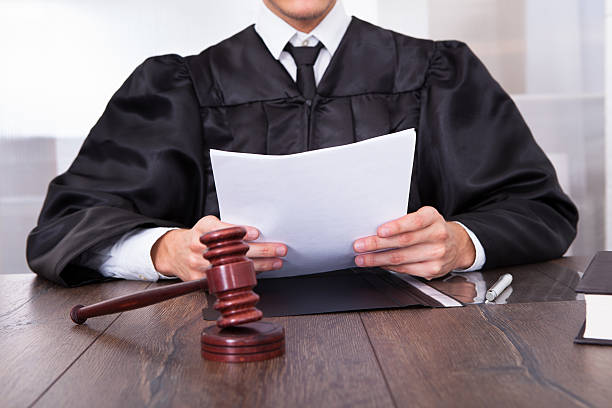The legal lexicon is rich with terms that often bewilder the layperson, and one such term is “disposed,” which, when encountered in the context of court proceedings, signifies a pivotal moment in the life of a legal case. The query “What Does Disposed Mean In Court?” is not just a search for a definition; it is a quest to understand the fate of a legal matter. This article aims to demystify the term and provide a comprehensive understanding of its significance within the judicial system.
With expertise drawn from the legal domain, we delve into the procedural landscape where the term “disposed” marks the conclusion of a case, but not necessarily the end of the legal journey. We will elucidate the various scenarios that can lead to a case being labeled as disposed and what implications this holds for the parties involved.
The value of this content lies in its ability to transform complex legal jargon into accessible knowledge, enabling readers to navigate the intricacies of court proceedings with newfound clarity. Whether you’re a legal professional, a student of law, or simply an individual with an interest in the workings of the justice system, this article will equip you with the essential insights into what it means when a case is disposed.
As you embark on this informative read, let your curiosity guide you through the nuances of legal outcomes and the ramifications they bear. By the end of this article, the term “disposed” will not only be a familiar entry in your legal vocabulary but also a concept you can comprehend and discuss with confidence.
Prepare to engage with a piece that not only answers a question but also opens the door to a deeper understanding of the legal processes that affect countless individuals and entities daily. Let’s begin unraveling the layers of meaning behind “disposed” in the court of law.
Contents
Definition of “Disposed” in Legal Context
In legal terminology, a disposed case is one that has been removed from the court’s docket. It is no longer pending and essentially closed as far as that court is concerned. Disposed applies to both criminal and civil cases. The key factor is that no further action will occur in that particular case.
Some key points about disposed cases:
- They are closed and no longer considered active or pending.
- Disposed indicates the case has been resolved somehow. The court no longer needs to take action.
- It applies to all types of cases – criminal, civil, family court, etc.
- Disposed cases can potentially be reopened or appealed under certain circumstances. More on that later.
The disposed status means the case has left the court’s hands through some form of legal resolution. Next, let’s look at why cases get disposed in the first place.
Why Was the Case Disposed?
For a case to be considered disposed, something specific must have happened to remove it from the court’s active docket. There are a few parties who have the authority to dispose of a case:
- The judge can dispose of a case through various rulings, judgments, dismissals, etc.
- The prosecutor has discretion to dispose of criminal cases through actions like dropping charges.
- The parties themselves can agree to dispose a civil case through settlement or alternative resolution.
Most often, the judge will dispose of a case after ruling on motions or holding a trial. Let’s look at some of the typical dispositions ordered by a judge:
Dismissals
One way a judge can dispose of a case is by dismissing it. This means the case is essentially dropped without a full ruling or trial. There are two main types of dismissals:
Dismissal with prejudice – The case can’t be refiled or appealed. This is a final disposition.
Dismissal without prejudice – The case can potentially be refiled or appealed later. The dismissal is not necessarily final.
Judges may dismiss cases for reasons like lack of evidence, lack of jurisdiction, technical errors in filing, and more. The dismissal can apply to the whole case or individual charges.
Judgments
Another way judges dispose of cases is by issuing rulings called judgments:
- Default judgment – Issued when the defendant fails to respond to a civil case. The plaintiff wins by default.
- Summary judgment – A judgment issued without a full trial. The judge rules one party has no viable claim or defense based on the undisputed facts.
- Directed verdicts – The judge enters judgment without sending the case to a jury.
- Declaratory judgments – The court rules on the rights, duties, or legal interests of parties without awarding damages.
Judgments legally resolve cases and therefore dispose them from the court’s docket. Now let’s look at how prosecutors can dispose of criminal cases.
Dismissals and Plea Agreements
For criminal cases, prosecutors have the authority to dispose of cases through:
- Dropping charges – Prosecutors can choose to dismiss charges prior to trial, disposing the case.
- Plea bargains – The defendant pleads guilty in exchange for reduced charges or a lesser sentence.
- Nolle prosequi – In Latin, this means the prosecution declines to prosecute. The case is dropped.
Through these actions, prosecutors can dispose of cases without a trial or judge’s ruling. Now let’s look at some other dispositions.
Acquittals and Verdicts
Criminal cases are disposed when they reach a verdict:
- Not guilty verdict – The defendant is acquitted of charges after a trial.
- Guilty verdict – The defendant is convicted, and the judge orders a sentence.
- Hung jury – A mistrial is declared because the jury could not reach a unanimous verdict.
Each of these trial outcomes disposes the criminal case. Additionally, cases can be disposed due to:
- Lack of jurisdiction – The court lacks legal authority over the case or parties.
- Charges withdrawn – The prosecutor withdraws criminal charges.
- Voluntary dismissal – In civil cases, the plaintiff voluntarily withdraws the lawsuit.
In all these situations, the case exits the court docket because no further action is required by the court.
Impact of a Disposition

Now that we understand how and why cases get disposed, what effect does this have? A disposition prevents any further litigation in that particular case. However, there are some caveats.
Reopening Disposed Cases
In limited circumstances, disposed cases can be reopened. For example:
- Criminal convictions can be appealed to higher courts. This may overturn the conviction.
- Civil judgments can be appealed within a timeframe after disposition.
- In extreme situations, disposed criminal cases involving wrongful convictions can be reopened.
However, legal doctrines like double jeopardy prevent most disposed criminal cases from being retried. So for the most part, disposed means closed for good.
Future Legal Actions
How a case is disposed impacts future legal options. For example:
- Civil plaintiffs may be barred from refiling similar lawsuits against the same defendant.
- Criminal defendants acquitted at trial generally can’t be retried for the same crime.
- But prosecutors may be able to file new charges against the defendant for the same incident.
The disposition establishes certain rights, restrictions, and precedents that carry forward.
Post-Disposition Rights and Obligations
Once a case is disposed:
- Parties may have to comply with judgments, injunctions, or other court orders.
- Defendants may have to pay fines, complete probation terms, or serve jail time per the disposition.
- Parties may retain certain rights to recover damages awarded by the court.
- Timeframes are set for any appeals, record expungement, and other post-disposition processes.
The disposition sets the legal aftermath into motion. Those obligations remain even after the case is off the court’s docket.
Timeframes After Disposition
Disposition triggers important deadlines for the parties and courts:
Appeals – Parties have limited time (e.g., 30 days) to file appeals of the disposition. Courts cannot hear appeals past the deadline.
Expungements – Defendants may petition to expunge criminal records after a set time period (e.g., 1-5 years) following the disposition.
Case records – Courts retain case records for a set number of years after disposition per records retention laws.
Being aware of these key timeframes can impact the parties’ rights and help bring full closure.
Case Disposed – What Now?
When you learn a case you’re involved with or tracking has been disposed, you’re probably wondering – what does this mean for me? Here are some next steps:
- Get the final case records – Order transcripts and documents from the court clerk if you need them.
- Review options for appeals – Speak with an attorney about potentially appealing the disposition within the timeframe.
- Expunge records – For eligible criminal dispositions, petition the court to have records sealed or expunged.
- Comply with court orders – Satisfy any fines, probation, payments owed per the disposition.
- Seek legal counsel – Consult an attorney to understand how the disposition impacts your rights and obligations going forward.
- Update records – For civil cases, have any liens, business records, titles, etc. updated to reflect the disposition.
- Closure – Accept that the case is truly closed, barring a successful appeal. Look ahead to the future.
Though the case may live on in records, the disposition gives everyone involved the chance to move forward.
Alternatives to Disposition

For parties wanting to avoid an unpredictable trial disposition, there are alternatives that can also permanently resolve cases:
- Settlement – Plaintiffs and defendants can agree to settle a civil case out of court. All parties sign a binding agreement disposing the case.
- Mediation – A neutral mediator helps parties negotiate a mutually agreeable settlement that disposes the case.
- Arbitration – An informal trial is held outside of court in front of an arbitrator, who then issues a binding decision disposing of the case.
Through these alternatives to litigation, parties can gain control over the disposition rather than leave it to a judge or jury trial verdict. In many cases, settlement or mediation may provide the most satisfactory closure.
In Summary
A disposed case is one that has exited the court system through some form of legal resolution. The parties, judge, or prosecutors cause a case to be disposed by dismissing charges, issuing final judgments, reaching verdicts, or otherwise settling the matter definitively.
The disposed status closes the case and triggers certain timeframes, rights, and obligations for the parties involved. However, appeals or expungement petitions may revive disposed cases under special circumstances. Understanding the ins and outs of disposed cases can help you gain closure while evaluating your options going forward.

Trayce served as a grassroots leader and activist in Texas as President of Dallas and Texas Eagle Forum.
Trayce is Mom Caucus Member, Texas Conservative Mamas, Texas Conservative Grassroots Coalition Leader, and Grassroots America Champion of Freedom Honoree.
She currently serves as the Eagle Forum National Issues Chair on Human Trafficking.
Trayce received a Bachelor’s Degree in Marketing from Texas A&M
Currently, she homeschools her youngest child age 13 and graduated her six oldest children, ages 31 to 19.







